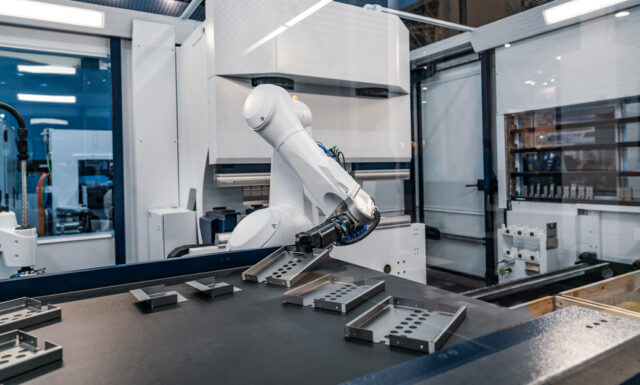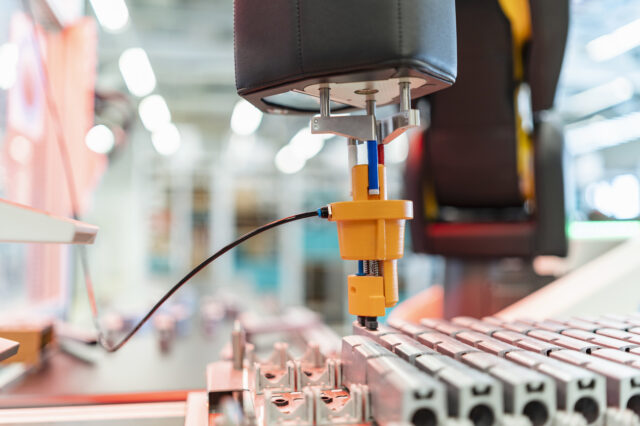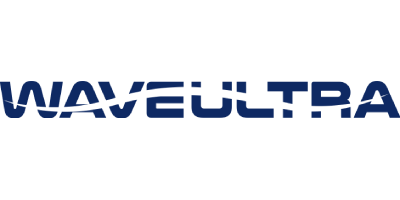Revolutionizing the Workforce: AI and Special Purpose Machines (SPMs) in the Future of Work
The integration of Artificial Intelligence (AI) and Special Purpose Machines (SPMs) is ushering in a new era of industrial revolution. As these technologies advance, they are not only transforming production processes but also reshaping the very nature of the workforce. Let’s explore the profound impact of AI and SPMs on jobs, skills, and the future of work.

Automation & Job Transformation
AI-driven SPMs are revolutionizing traditional manufacturing processes by automating repetitive tasks and increasing production efficiency. This shift towards automation inevitably raises questions about the future of human jobs.
-
- Reduction of Repetitive Tasks
Routine and monotonous tasks that were previously performed by human workers are now being taken over by AI-powered SPMs. This frees up human resources for more strategic and creative roles. - Skill Shifts and Upgradation
As machines handle routine tasks, there is a growing demand for workers with skills in programming, machine maintenance, data analysis, and AI integration. The workforce must adapt to these changing skill requirements.
- Reduction of Repetitive Tasks
Enhanced Productivity and Quality
AI-driven SPMs offer unparalleled precision, consistency, and quality control. This not only improves product quality but also boosts overall productivity.
-
- Streamlined Production Processes
SPMs equipped with AI algorithms can optimize production schedules, inventory management, and supply chain logistics. This results in faster turnaround times and reduced waste. - Real-time Monitoring and Feedback
AI-powered sensors embedded in SPMs provide real-time data on production processes. This allows for immediate adjustments and proactive maintenance, ensuring uninterrupted operations.
- Streamlined Production Processes
Collaboration Between Humans and Machines
The future of work is not about humans versus machines but rather about humans working alongside intelligent machines. Collaboration between AI and human workers will redefine job roles and create new opportunities.
-
- Cobotics in Manufacturing
Collaborative robots, or cobots, work alongside human operators in a shared workspace. They excel in tasks that require precision and strength, while humans focus on tasks that require problem-solving and decision-making. - Cross-disciplinary Teams
AI and SPMs encourage forming cross-disciplinary teams, where engineers, data scientists, and technicians collaborate to optimize machine performance and drive innovation.
- Cobotics in Manufacturing
Reskilling and Lifelong Learning
The rapid evolution of technology necessitates a culture of continuous learning and upskilling among the workforce.
-
- Adaptive Learning Platforms
AI-driven learning platforms analyze individual learning styles and preferences to deliver personalized training programs. This enables workers to acquire new skills at their own pace. - Upskilling for the Digital Age
Training programs focused on programming, data analytics, robotics, and AI integration will become essential for workers to stay relevant in a technology-driven workforce.
- Adaptive Learning Platforms
Job Creation in New Industries
While AI and SPMs may disrupt certain industries, they also pave the way for the emergence of new sectors and job opportunities.
-
- Emerging Industries
Industries such as AI development, robotics engineering, data analysis, and smart manufacturing are experiencing rapid growth. These sectors offer diverse career paths and opportunities for innovation. - Entrepreneurial Opportunities
The democratization of AI and SPM technology enables individuals to start their ventures. Small businesses and startups can leverage these technologies to create innovative products and services.

- Emerging Industries
Ethical and Social Implications
As AI and SPMs become more integrated into the workforce, ethical considerations surrounding privacy, job displacement, and algorithmic bias come to the forefront.
-
- Ethical AI Implementation
Companies must prioritize ethical AI practices, ensuring transparency, accountability, and fairness in decision-making processes. - Addressing Job Displacement
Governments and organizations must develop policies and programs to support workers affected by automation, such as retraining initiatives and job transition assistance. - Mitigating Algorithmic Bias
Steps must be taken to eliminate bias in AI algorithms, which could perpetuate existing inequalities in the workforce.
- Ethical AI Implementation
Conclusion
The convergence of AI and SPMs is reshaping the workforce in profound ways. While automation may replace certain jobs, it also creates new opportunities for innovation, collaboration, and skill development. The key to navigating this transformative era lies in embracing lifelong learning, fostering collaboration between humans and machines, and addressing the ethical and social implications of AI integration. By doing so, we can create a future where technology enhances human potential, productivity, and well-being in the workplace.


